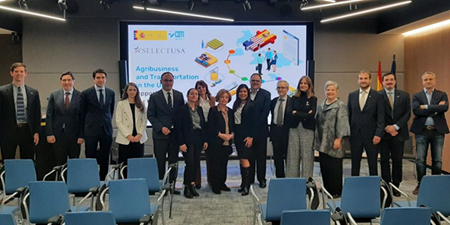
The world is filled with millions of opportunities because the world is filled with millions of people. There are so many undiscovered careers and lifestyles that I was not aware of before my PPIP experience, and the people I met while working as an intern at the U.S. Embassy in Spain revealed the limitless opportunities that exist on a global level. I lived in Madrid, Spain for the semester, where I helped facilitate international trade between Spain and America. My biggest takeaway from my policy internship was just how potent of a role people play in policy and diplomacy, as shown in the following 3 ways:
1. Diplomacy is synonymous with networking
One of the things I learned while working with foreign service officers is that diplomacy is facilitated by connections. In the international trade world, knowing the right person in the local business world for an American business to be able to talk to is all that is needed to influence deals and policy. Similarly, friendly relationships with foreign leaders allow you to have more influence than you would think and to be able to understand foreign issues from multiple points of view. Being able to broaden your network gives insight into the personal objectives of each person and connects the dots of why people stand a certain way on an issue and how it benefits their interests.
2. The big, talked-about names aren’t the true policymakers
Before this internship, I had assumed that all the big names (the presidents, directors, secretaries, ambassadors) were the policymakers. However, it is the people in their office, not the actual figureheads, that make things happen. This is not to say that the top dogs don’t ultimately approve or deny the issues, but rather that the people that choose what to present (or not present) have a significant part in the policy-making process. The agenda is set by workers in the office—including interns!—and leadership simply follows that agenda since they are often too busy to do otherwise.
For example, my office was tasked with preparing briefs for the ambassador on a commercial event where the ambassador would be a guest speaker. I was assigned to write the first draft of the brief and the speech the ambassador would give at the event. Although there were some edits, the majority of my original content was cleared. At the event, I then heard the ambassador say, almost word for word, what I wrote. I am still awestruck that a mere intern can have such a profound influence on international relations.
3. You’ll be surprised who you can meet
With work in the U.S. Commercial Service at the embassy, I was surprised by just how many different kinds of people I met, both in terms of nationality and profession. I met European CEOs and top executives with my work for the American Chamber of Commerce in the European Union as well as at the embassy receptions my office sponsored. Similarly, I worked with both Spanish government officials and representatives from the U.S. states in international trade. In the consular department of the embassy, I met many foreign nationals from all types of backgrounds that are trying to get a visa to the USA. I also saw many Americans—usually in some sort of need—through the American Citizen Services that the embassy provides in Spain. Even within the embassy, there are many fascinating people that work in policy and diplomacy. Some of the ones that stand out are the people at NASA, the regional security office, foreign agriculture services, the Marines, and political analysts.
I have greatly enjoyed my PPIP experience and my time in the U.S. Commercial Service. The insights I have learned and the people I have met made this experience both informative and worthwhile. I know the people and connections I have made will be long-lasting and beneficial relationships.
Austin Kees
Department of Commerce at the U.S. Embassy
Madrid, Spain | Spring 2023
